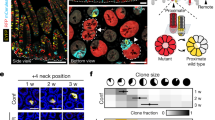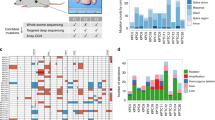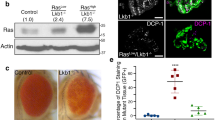Abstract
Somatic activation of the KRAS proto-oncogene is evident in almost all pancreatic cancers, and appears to represent an initiating event. These mutations occur primarily at codon 12 and less frequently at codons 13 and 61. Although some studies have suggested that different KRAS mutations may have variable oncogenic properties, to date there has been no comprehensive functional comparison of multiple KRAS mutations in an in vivo vertebrate tumorigenesis system. We generated a Gal4/UAS-based zebrafish model of pancreatic tumorigenesis in which the pancreatic expression of UAS-regulated oncogenes is driven by a ptf1a:Gal4-VP16 driver line. This system allowed us to rapidly compare the ability of 12 different KRAS mutations (G12A, G12C, G12D, G12F, G12R, G12S, G12V, G13C, G13D, Q61L, Q61R and A146T) to drive pancreatic tumorigenesis in vivo. Among fish injected with one of five KRAS mutations reported in other tumor types but not in human pancreatic cancer, 2/79 (2.5%) developed pancreatic tumors, with both tumors arising in fish injected with A146T. In contrast, among fish injected with one of seven KRAS mutations known to occur in human pancreatic cancer, 22/106 (20.8%) developed pancreatic cancer. All eight tumorigenic KRAS mutations were associated with downstream MAPK/ERK pathway activation in preneoplastic pancreatic epithelium, whereas nontumorigenic mutations were not. These results suggest that the spectrum of KRAS mutations observed in human pancreatic cancer reflects selection based on variable tumorigenic capacities, including the ability to activate MAPK/ERK signaling.
This is a preview of subscription content, access via your institution
Access options
Subscribe to this journal
Receive 50 print issues and online access
$259.00 per year
only $5.18 per issue
Buy this article
- Purchase on Springer Link
- Instant access to full article PDF
Prices may be subject to local taxes which are calculated during checkout




Similar content being viewed by others
References
Kanda M, Matthaei H, Wu J, Hong SM, Yu J, Borges M et al. Presence of somatic mutations in most early-stage pancreatic intraepithelial neoplasia. Gastroenterology 2012; 142: 730–733 e739.
Guerra C, Schuhmacher AJ, Canamero M, Grippo PJ, Verdaguer L, Perez-Gallego L et al. Chronic pancreatitis is essential for induction of pancreatic ductal adenocarcinoma by K-Ras oncogenes in adult mice. Cancer Cell 2007; 11: 291–302.
Hingorani SR, Petricoin EF, Maitra A, Rajapakse V, King C, Jacobetz MA et al. Preinvasive and invasive ductal pancreatic cancer and its early detection in the mouse. Cancer Cell 2003; 4: 437–450.
Aguirre AJ, Bardeesy N, Sinha M, Lopez L, Tuveson DA, Horner J et al. Activated Kras and Ink4a/Arf deficiency cooperate to produce metastatic pancreatic ductal adenocarcinoma. Genes Dev 2003; 17: 3112–3126.
Krasinskas AM, Moser AJ, Saka B, Adsay NV, Chiosea SI . KRAS mutant allele-specific imbalance is associated with worse prognosis in pancreatic cancer and progression to undifferentiated carcinoma of the pancreas. Mod Pathol 2013; 26: 1346–1354.
Leach SD . Pisces and cancer: the stars align. Zebrafish 2009; 6: 317.
Yen J, White RM, Stemple DL . Zebrafish models of cancer: progress and future challenges. Curr Opin Genet Dev 2014; 24C: 38–45.
Park SW, Davison JM, Rhee J, Hruban RH, Maitra A, Leach SD . Oncogenic KRAS induces progenitor cell expansion and malignant transformation in zebrafish exocrine pancreas. Gastroenterology 2008; 134: 2080–2090.
Davison JM, Akitake CM, Goll MG, Rhee JM, Gosse N, Baier H et al. Transactivation from Gal4-VP16 transgenic insertions for tissue-specific cell labeling and ablation in zebrafish. Dev Biol 2007; 304: 811–824.
Pisharath H, Parsons MJ . Nitroreductase-mediated cell ablation in transgenic zebrafish embryos. Methods Mol Biol 2009; 546: 133–143.
Barbacid M . ras oncogenes: their role in neoplasia. Eur J Clin Invest 1990; 20: 225–235.
Charbel C, Fontaine RH, Malouf GG, Picard A, Kadlub N, El-Murr N et al. NRAS mutation is the sole recurrent somatic mutation in large congenital melanocytic nevi. J Invest Dermatol 2014; 134: 1067–1074.
Fukahori M, Yoshida A, Hayashi H, Yoshihara M, Matsukuma S, Sakuma Y et al. The associations between RAS mutations and clinical characteristics in follicular thyroid tumors: new insights from a single center and a large patient cohort. Thyroid 2012; 22: 683–689.
Parikh C, Subrahmanyam R, Ren R . Oncogenic NRAS rapidly and efficiently induces CMML- and AML-like diseases in mice. Blood 2006; 108: 2349–2357.
Yoo J, Robinson RA . ras gene mutations in salivary gland tumors. Arch Pathol Lab Med 2000; 124: 836–839.
Er TK, Chen CC, Bujanda L, Herreros-Villanueva M . Clinical relevance of KRAS mutations in codon 13: Where are we? Cancer Lett 2014; 343: 1–5.
Martin P, Leighl NB, Tsao MS, Shepherd FA . KRAS mutations as prognostic and predictive markers in non-small cell lung cancer. J Thorac Oncol 2013; 8: 530–542.
Prior IA, Hancock JF . Ras trafficking, localization and compartmentalized signalling. Semin Cell Dev Biol 2012; 23: 145–153.
Guerrero S, Casanova I, Farre L, Mazo A, Capella G, Mangues R . K-ras codon 12 mutation induces higher level of resistance to apoptosis and predisposition to anchorage-independent growth than codon 13 mutation or proto-oncogene overexpression. Cancer Res 2000; 60: 6750–6756.
Morelli MP, Kopetz S . Hurdles and complexities of codon 13 KRAS mutations. J Clin Oncol 2012; 30: 3565–3567.
Kraus MC, Seelig MH, Linnemann U, Berger MR . The balanced induction of K-ras codon 12 and 13 mutations in mucosa differs from their ratio in neoplastic tissues. Int J Oncol 2006; 29: 957–964.
Auer TO, Duroure K, De Cian A, Concordet JP, Del Bene F . Highly efficient CRISPR/Cas9-mediated knock-in in zebrafish by homology-independent DNA repair. Genome Res 2014; 24: 142–153.
Zu Y, Tong X, Wang Z, Liu D, Pan R, Li Z et al. TALEN-mediated precise genome modification by homologous recombination in zebrafish. Nat Methods 2013; 10: 329–331.
Hu G, Goll MG, Fisher S . PhiC31 integrase mediates efficient cassette exchange in the zebrafish germline. Dev Dyn 2011; 240: 2101–2107.
Mosimann C, Puller AC, Lawson KL, Tschopp P, Amsterdam A, Zon LI . Site-directed zebrafish transgenesis into single landing sites with the phiC31 integrase system. Dev Dyn 2013; 242: 949–963.
Roberts JA, Miguel-Escalada I, Slovik KJ, Walsh KT, Hadzhiev Y, Sanges R et al. Targeted transgene integration overcomes variability of position effects in zebrafish. Development 2014; 141: 715–724.
Acknowledgements
The authors thank Mary Chico, Mara Swaim, Anzer Habibullah and Frazer Matthews for expert administrative and technical support. This work was supported by NCI P01 CA134292. SDL was further supported by the Paul K Neumann Professorship in Pancreatic Cancer at Johns Hopkins University.
Author information
Authors and Affiliations
Corresponding author
Ethics declarations
Competing interests
The authors declare no conflict of interest.
Additional information
Supplementary Information accompanies this paper on the Oncogene website
Rights and permissions
About this article
Cite this article
Park, J., Johnson, N., Liu, S. et al. Differential in vivo tumorigenicity of diverse KRAS mutations in vertebrate pancreas: A comprehensive survey. Oncogene 34, 2801–2806 (2015). https://doi.org/10.1038/onc.2014.223
Received:
Revised:
Accepted:
Published:
Issue Date:
DOI: https://doi.org/10.1038/onc.2014.223
This article is cited by
-
Liver metastasis composed of pure squamous cell carcinoma component from pancreatic pure ductal adenocarcinoma: a case report
Surgical Case Reports (2023)
-
Enhanced BRAF engagement by NRAS mutants capable of promoting melanoma initiation
Nature Communications (2022)
-
Mutational Mosaics of Cell-Free DNA from Pancreatic Cyst Fluids
Digestive Diseases and Sciences (2020)
-
A model for RAS mutation patterns in cancers: finding the sweet spot
Nature Reviews Cancer (2018)
-
CUT-PCR: CRISPR-mediated, ultrasensitive detection of target DNA using PCR
Oncogene (2017)



